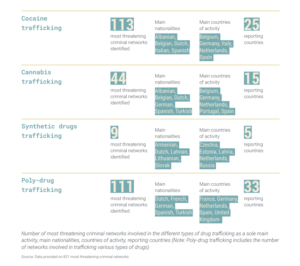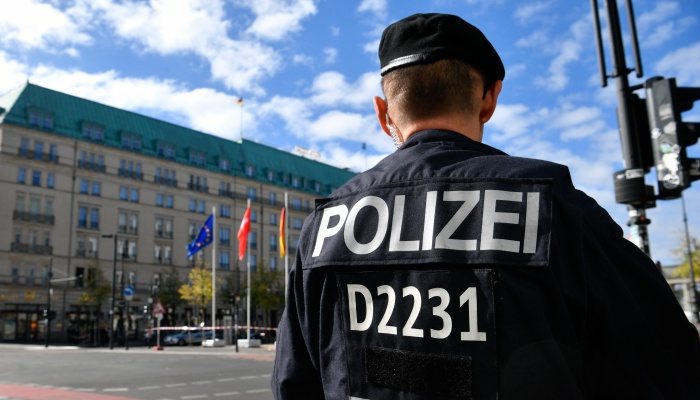Europol, the European Union’s law enforcement agency, published a report on Friday analyzing the characteristics of the EU’s “most threatening criminal networks,” highlighting Turkish nationals’ central role in these networks and their activity in cocaine and cannabis trafficking and money laundering.
Europol published a detailed 51-page report that provides a comprehensive overview of the internal structures of 821 organizations involved in various criminal activities ranging from drug trafficking to smuggling.
According to the report, more than 25,000 people are estimated to be members of “the most threatening criminal networks” identified in the report.
“Most networks are highly diverse in terms of nationality composition.
68 % of the criminal networks contain members of multiple nationalities,
ranging anywhere between 2 to 10 nationalities, and sometimes even
more. The main nationalities are Albania, Belgium, France, Germany,
Italy, the Netherlands, Poland, Spain, Türkiye and Ukraine. Most criminal
networks are made up of both EU and non-EU nationals,” the report, titled “Decoding the EU’s most threatening criminal networks,” points out.
The report, the first of its kind, aims to provide policymakers and law enforcement agencies with key insights to combat these groups.
The report highlights the characteristics of the continent’s most dangerous criminal networks and summarizes their nature in four key traits: agile, borderless, controlling and destructive.
These criminal organizations show remarkable agility when it comes to using legal businesses to disguise their illegal activities.
They operate across borders in the EU and beyond and exercise tight control over their criminal enterprises.
The destructive impact of the networks is significant and has a direct impact on the security, legal integrity and economic stability of the EU, with far-reaching consequences for its citizens, the report underlines.
The report finds that more than half of these networks are also involved in drug trafficking, along with other criminal activities such as money laundering, fraud and human trafficking, underlining the large and diverse threat they pose.
This analysis underscores the urgent need for strategic and coordinated action to dismantle these sophisticated criminal operations and mitigate their detrimental impact on society.
The report shows that the networks identified include members from 112 different nationalities. While 32 percent of these networks consist of members of a single nationality, indicating a tendency towards homogeneity within certain groups, the majority have a diverse composition, underlining the international nature of organized crime.
These homogeneous networks often originate from a single EU country, with Italian, Romanian, Polish and French networks being particularly well known for activities ranging from drug trafficking to organized property crime.
Networks from non-EU countries, particularly Albania, Bosnia and Herzegovina, China and Georgia, also have a unique national composition and are involved in crimes ranging from drug trafficking to online fraud and organized property crime.
Despite the existence of homogenous networks, the vast majority of the most threatening criminal organizations operate with members of different nationalities.
Although they do not share a common national background, they share a common non-EU background, the report underlines.
This diverse composition is often observed in networks based on drug trafficking, money laundering and various forms of organized crime, with a high degree of international cooperation and coordination. While such multinational networks maintain close ties to their regions of origin, they often use shared cultures, languages and histories to strengthen their cohesion. However, other factors such as family ties, subcultures or purely opportunistic reasons also contribute significantly to cohesion within these networks and underline the multi-layered and deeply interconnected nature of serious and organized crime within the EU.

Among these networks, some are focused on cannabis trafficking and were found to involve Albanians, Belgians, Dutch, Germans, Spaniards and Turks, while the networks that smuggle multiple types of drugs are led by Dutch, French, German, Spanish and Turkish nationals.
According to the findings of the report, most of the people involved in smuggling come from Iraq, Moldova, Romania, Syria, Turkey and Ukraine, with activities taking place mainly in Belgium, France, Germany, Italy, the Netherlands, Turkey and Ukraine.
The report also shows that 6 percent of the most threatening criminal groups are controlled from outside the EU, from countries such as the UAE, Turkey and the UK.
In terms of fraud and arms trafficking, Europol found that fraud is the second most common activity among the most dangerous criminal networks, with investment and romance scams leading the operations, mainly targeting the elderly. Call centers that played an important role in these scams were mainly located in India, Israel, Turkey and the United Kingdom.
The report also pointed to the increasing importance of Turkey in the trade of “non-original, counterfeit firearms” in the EU. It is suspected that these weapons are mostly manufactured in Turkey and smuggled into the EU by Turkish criminal networks.



